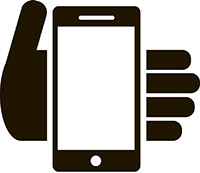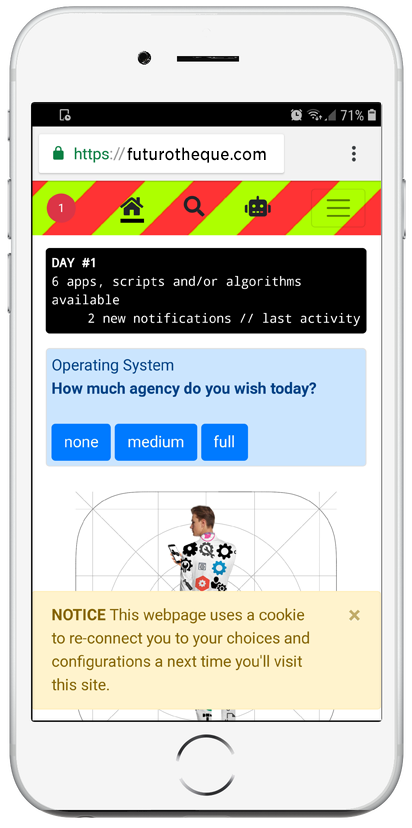

loading...
The "Futurotheque" is a fictional app store with apps that will confront you with speculative future scenarios and dilemmas. It can be seen as an open ended, real-life roleplaying narrative about our life in the next era of computing. It's a story situated in a future in which the man/machine integration has reached a stage where software is interfering in each and every aspect of life, mainly caused by the permanent influence of an augmented reality wearable.
Presumably, in a near future a light weight and comfortable AR wearable will be available, and for the sake of this semi-fictional story it's assumed that people have finally dropped resistance and accepted devices into their daily lives. It will cause people to morph into some sort of robot, when they're following tips, suggestions and instructions appearing in their HUD (heads up display). With sensors and a 24/7 always-on AI powered camera monitoring us, the cloud will be able to make the HUD interactions relevant and useful. It is a scenario that has oftentimes been covered in series and books, but in this narrative it's a hands-on experience. Instead of an AR wearable a smartphone is used to interact in the story. And even though the speculative software in this story does not exist yet, it plays a role in the narrative through configuration options, the interactions and the notifications.
To experience the Futurotheque:
Open this website on your smartphone
When you open the page, you'll start an experience that runs you through personal tech developments that are expected to happen durig the next 10 years. Find out about the future and the apps you'll be using by browsing the set of speculative apps, organised by year.
Think of your mobile as an interface and a controller for your semi-digital future life.

Presumably, in a near future a light weight and comfortable AR wearable will be available, and for the sake of this semi-fictional story it's assumed that people have finally dropped resistance and accepted devices into their daily lives. It will cause people to morph into some sort of robot, when they're following tips, suggestions and instructions appearing in their HUD (heads up display). With sensors and a 24/7 always-on AI powered camera monitoring us, the cloud will be able to make the HUD interactions relevant and useful. It is a scenario that has oftentimes been covered in series and books, but in this narrative it's a hands-on experience. Instead of an AR wearable a smartphone is used to interact in the story. And even though the speculative software in this story does not exist yet, it plays a role in the narrative through configuration options, the interactions and the notifications.
To experience the Futurotheque:
Open this website on your smartphone
When you open the page, you'll start an experience that runs you through personal tech developments that are expected to happen durig the next 10 years. Find out about the future and the apps you'll be using by browsing the set of speculative apps, organised by year.
Think of your mobile as an interface and a controller for your semi-digital future life.
